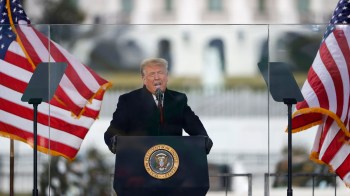Is spending your rebate a civic duty?
TEXT OF STORY
KAI RYSSDAL: The president signed his 2008 economic report today. A quick plot summary from the White House press office would go something like this: fundamentally sound, uncertain in the short-term. That’s why he’s going to sign another economic measure this week, Wednesday probably — the $168 billion economic stimulus package. Rebate checks should reach people who qualify sometime in May. The government’s idea is to have them plow those millions of dollars back into the economy, which puts a lot of faith in the fickle American consumer.
Nancy Marshall Genzer reports.
NANCY MARSHALL GENZER: Just the label “rebate” could be enough to send consumers to the bank with their checks. Nicholas Epley teaches at the University of Chicago Graduate School of Business. The social psychologist says the checks should be called “bonuses.” He did an experiment. A group of very lucky volunteers got $50 checks. Half were told it was a rebate, the other half that it was a bonus. Epley says the bonus bunch spent more than twice as much.
NICK EPLEY: A rebate is like getting a reimbursement on a travel expense. You get your $500 reimbursement check back, you go on a trip to the bank. At the end of the year though, if you get a $500 bonus, you take that money and you go to the Bahamas. You don’t go to the bank with that.
But even if the rebates became bonuses, lots of consumers still wouldn’t spend. Economist Joel Slemrod, at the University of Michigan, says that’s because of the “fear factor.” He surveyed consumers during the last round of rebates, in the midst of the 2001 recession. Only 22 percent of them spent the checks right away. Slemrod says this year’s crop of checks could meet a similar fate. Once again people are worried about a recession, and that’s on top of the subprime crisis.
JOEL SLEMROD: If you’re worried about where you’re going to find the money for your next mortgage payment, getting a $1,000 check might be exactly the ticket, and if you put the $1,000 to pay off the debt on your mortgage, that’s not spending. That’s paying down your debt.
But let’s not forget about the “fib factor.”
SLEMROD: “Never ask of money spent where the spender thinks it went.”
Slemrod uses that Robert Frost poem in his research reports to illustrate that consumers want to sound like they’re doing the right thing, but maybe they’re lying when they claim they’ll save the rebate money. I decided to ask them myself. I stood right outside the U.S. Treasury building next to the White House. I ran into some button-down types. They’re self-described savers. Melissa Clark is a financial analyst for the government. She thinks the rebate checks are dumb.
MELISSA CLARK: I don’t think this is the appropriate means to do a stimulus package, so I see my protest as to put it in a savings account.
Some tourists who were sight-seeing nearby weren’t so rebellious, but they won’t be buying luxuries with the rebate. Mary Crawford is from Pearl River Louisiana.
MARY CRAWFORD: I have better things to do with my money than go buy a big screen TV, like buying groceries and fuel, clothing and medicine.
Of the nine people I talked to, four said they’d spend the money. I never did find any big spenders though.
In Washington, I’m Nancy Marshall Genzer for Marketplace.
There’s a lot happening in the world. Through it all, Marketplace is here for you.
You rely on Marketplace to break down the world’s events and tell you how it affects you in a fact-based, approachable way. We rely on your financial support to keep making that possible.
Your donation today powers the independent journalism that you rely on. For just $5/month, you can help sustain Marketplace so we can keep reporting on the things that matter to you.


















